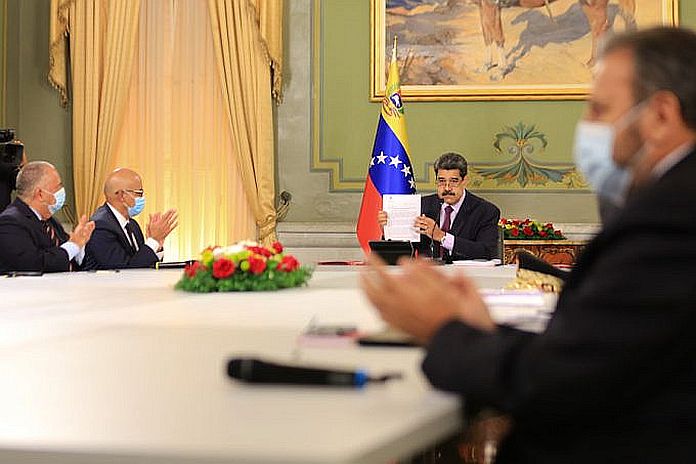By Ricardo Vaz
Mérida, (venezuelanalysis.com) – The Venezuelan government has taken actions to defend its claim over the disputed Essequibo region.
President Nicolas Maduro held a meeting with the country’s National Defense Council and State Council on Thursday to address the territorial dispute between Venezuela and neighboring Guyana.
The Venezuelan government rejects a recent decision by the United Nations’ International Court of Justice (ICJ). On December 18, with a 12-4 majority, the ICJ judges ruled that the court has jurisdiction to settle a claim brought forward by the Guyanese government arguing that the border was established by a controversial 1899 arbitration agreement in which no Venezuelan negotiators were present.
In response, the Maduro government reaffirmed its rejection of the 1899 ruling and its adherence to the UN-brokered Geneva Agreement signed by all parties in 1966 as the only binding international framework.
“This is a cause uniting an entire nation to fight against the dispossession of a territory that always belonged to Venezuela,” the Venezuelan president said in the televised meeting.
Maduro added that the Geneva Agreement stipulates that the border dispute must be settled by direct negotiations between the two countries and that his administration would send a letter to UN Secretary-General Antonio Guterres to defend Caracas’ claim over the Essequibo.
“We believe your good will and efforts are more needed than ever to restart direct talks between Guyana and Venezuela in order to achieve a peaceful and mutually beneficial agreement,” the letter reads.
The Venezuelan government will likewise address a letter to ICJ president Abdulqawi Ahmed Yusuf, arguing that the Hague-based court has no jurisdiction to rule on a unilateral Guyanese suit and demanding that Venezuela be allowed to defend its territorial claim. Maduro went on to denounce “suspicious” efforts to rush the hearings, which are set for January 25 after the Caribbean nation allegedly objected to the original January 15 date.
Earlier on Thursday, the newly-seated National Assembly (AN) unanimously approved a nine-point motion rejecting the ICJ ruling and defending the 1966 Geneva Agreement.
The AN document endorsed the government’s diplomatic efforts and the reopening of direct talks with Venezuela’s eastern neighbor. The legislative body also formed a special commission, headed by lawyer Hermann Escarra, to focus on the Essequibo claim.
The diplomatic quarrel over the 160,000 square kilometer, sparsely populated strip of land, which was taken by the British colonial regime in the late 19th century, recently came to the fore following the discovery of an estimated 15 billion barrels of oil in the Essequibo’s maritime waters.
Caracas has repeatedly voiced its opposition to Guyana’s decision to allow US multinational Exxon Mobil to drill in the disputed area, claiming that it violates the 1966 accords. For its part, Washington has backed Georgetown’s claim to the strip and pledged to execute joint military drills.





